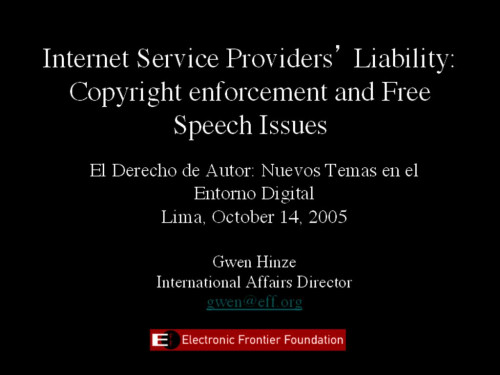The U.S. government is employing a new strategy to effect the global entrenchment of overly restrictive copyright law: incorporating DMCA-like copyright provisions in its free trade agreements. Having failed to persuade nations worldwide to adopt U.S.-style copyright regulations via the WIPO Copyright and WIPO Performances and Phonograms Treaties the government has included anti-circumvention obligations in its bilateral Free Trade Agreements (FTAs) with Jordan (Article 4(13)) Singapore (Article 16.4(7)) Chile (Article 17.7(5)) Morocco (Article 15.5(8)) Australia (Article 17.4(7)) CAFTA (Article 15.5(7)) Bahrain (Article 14.4(7)) and Oman (Article 15.4(7)). It now seeks to include similar provisions in its current multilateral free trade negotiations with 33 countries in the Americas.
This time however there's a twist: the provisions will be even more restrictive. How so? Like the DMCA the draft of the Free Trade Area of the Americas (FTAA) IP chapter contains a provision that would require all FTAA countries to ban the circumvention of technological protection measures. It would also similarly prohibit the manufacture and distribution of certain circumvention tools technologies and devices. But while the DMCA contains a few narrow exemptions to these prohibitions the draft FTAA IP chapter contains none. As a result FTAA countries' national copyright law will be entirely supplanted by "anti-circumvention" law. In effect this allows U.S. copyright owners' rights to trump FTAA countries' national sovereignty and domestic public policy priorities and consumers and technology developers in FTAA countries risk losing all of their existing rights under their own national copyright laws.
When the FTAA negotiations stalled over the inclusion of intellectual property provisions in November 2003 the U.S. Trade Representative moved to Plan B. It announced that it would start negotiations for bilateral FTAs with various Latin American countries: Peru Colombia and Ecuador (the Andean community) and Panama. These negotiations are still under way. An FTA with 5 Central American countries (Costa Rica El Salvador Guatemala Honduras and Nicaragua) and the Dominican Republic that includes DMCA-style provisions went into effect in August 2005.
Below are resources on the technological protection measure provisions in the FTAA and bilateral FTAs as well as information about the impact of the DMCA's provisions in the United States since 1998. Also below are resources on Internet Service Provider provisions modeled on section 512 of the U.S. copyright legislation in recent bilateral FTAs together with information about how the U.S. ISP safe harbor provisions have been used since 1998.
 Protect digital privacy and free expression. EFF's public interest legal work, activism, and software development preserve fundamental rights.
Protect digital privacy and free expression. EFF's public interest legal work, activism, and software development preserve fundamental rights.








